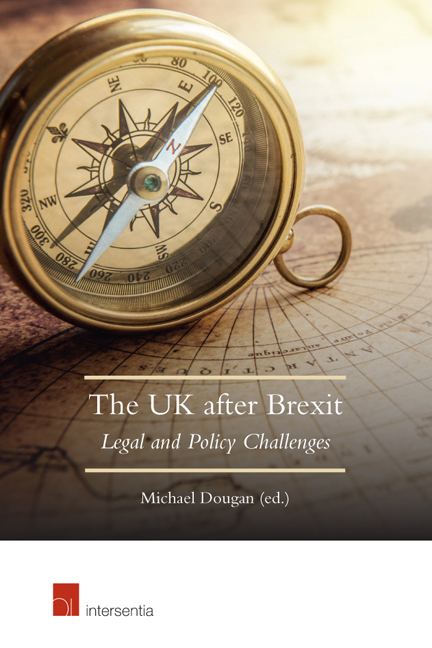Book contents
- Frontmatter
- Contents
- List of Authors
- Editor's Introduction
- Part I Constitutional Issues
- Part II Substantive Policies
- Chapter 5 Brexit and Employment Law
- Chapter 6 UK Environmental Law Post-Brexit
- Chapter 7 Extracting the UK from EU Financial Services Governance: Regulatory Recasting or Shadowing from a Distance?
- Chapter 8 Intellectual Property Law and Brexit: A Retreat or a Reaffirmation of Jurisdiction?
- Chapter 9 May We Stay? Assessing the Security of Residence for EU Citizens Living in the UK
- Chapter 10 Cross-Border Criminal Cooperation aft er Brexit
- Part III External Relations
- About the Editor
Chapter 8 - Intellectual Property Law and Brexit: A Retreat or a Reaffirmation of Jurisdiction?
from Part II - Substantive Policies
Published online by Cambridge University Press: 13 October 2018
- Frontmatter
- Contents
- List of Authors
- Editor's Introduction
- Part I Constitutional Issues
- Part II Substantive Policies
- Chapter 5 Brexit and Employment Law
- Chapter 6 UK Environmental Law Post-Brexit
- Chapter 7 Extracting the UK from EU Financial Services Governance: Regulatory Recasting or Shadowing from a Distance?
- Chapter 8 Intellectual Property Law and Brexit: A Retreat or a Reaffirmation of Jurisdiction?
- Chapter 9 May We Stay? Assessing the Security of Residence for EU Citizens Living in the UK
- Chapter 10 Cross-Border Criminal Cooperation aft er Brexit
- Part III External Relations
- About the Editor
Summary
INTRODUCTION
The effect of European Union law on intellectual property (IP) law in the United Kingdom has been profound. There is no area of IP law that does not feature EU legislation or CJEU case law. In fact, it may be the most ‘Europeanised’ area of private law. For this reason, ‘Brexit’ will undoubtedly have a massive impact on the current IP framework in the UK. A clear picture of the post-Brexit IP landscape, however, can only be drawn once we know the outcome of the negotiations pursuant to the Article 50 TEU procedure. Our intention with this chapter is to give an overview of the current state of play in terms of EU law's impact on IP law, and to consider the most likely outcome of Brexit on IP law in the UK.
At the outset, we must emphasise that the United Kingdom's ‘exiting’ of the European Union will primarily affect IP laws, currently valid in the UK, that derive from EU measures. Long before the UK joined the then European Economic Community (EEC) in 1973 it had established its own national jurisdiction to grant, for example, trade marks and patents, and it will continue to possess this jurisdiction, post-Brexit. Moreover, the UK can claim an indigenous tradition of copyright legislation going back to the Statute of Anne in 1710. Finally, the UK is a signatory to several measures which have been negotiated and agreed outside of the European Union, and which need to be distinguished from EU measures. For instance, there is the UPOV Convention establishing a sui generis right for plant varieties, as well as the European Patent Convention (EPC) which provides for a centralised system for granting European patents (EPs). These measures operate outside the ambit of the European Union and Brexit will not directly affect the UK's involvement in these measures. With this chapter, we aim to explain what areas will be affected by Brexit, and which ones will not.
- Type
- Chapter
- Information
- The UK after BrexitLegal and Policy Challenges, pp. 159 - 180Publisher: IntersentiaPrint publication year: 2017



